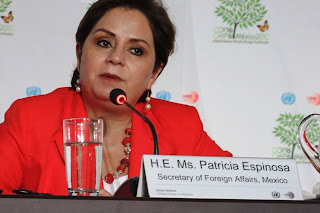By Makereta Komai, Climate Pasifika Media in Cancun, Mexico
06 DECEMBER 2010 CANCUN ---- Mexican President, Felipe Calderon wants more civil society input into the Conference of Parties process, breaking with tradition to convene a special stakeholder’s engagement Monday.
Addressing both Parties and hundreds of non-governmental organisations accredited for COP16 in Cancun, President Calderon urged South Africa, the hosts of COP17 next year to include the ‘voices of the people’ in the negotiation process.
“There should be a more formal character for civil societies, said President Calderon, who chaired the two hour session.
“We need society participation. Clearly, there is a need for a more open and inclusive role for civil society at future Conference of Parties.
President Calderon said the climate change negotiations should not only focus on governments but include the views of the people, who represent nearly 7 billion of the world’s population.
“The negotiations must hear all voices, the indigenous peoples, the women and children, the business community etc.
“Combating climate change is everyone’s business and every step must be taken now to mobilise our societies to understand what needs to be done to fight climate change, said President Calderon.
After presentations from selected civil society groups, he opened up the floor for discussions.
A representative of the youth constituency praised Mexico for allowing the voices of young people to be heard.
“We beg negotiators to do their best and reach an agreement that will save the world for the future generation. You need to move mountains, ending with “Yes we can, Yes can and Yes we can!
The Mexican leader also urged more participation of women in the negotiations.
“Women are mostly the victims of climate change and yet they continue to maintain our household. They are the backbone of society, thus they need to have a voice also. I believe if more women are involved then we have a more human solution to the problem of climate change, said President Calderon.
 |
| Exhibition booth for Gender CC - Women for Climate Justice |
His comments were supported by the former President of Ireland and honorary President of Oxfam, Mary Robinson.
“Not only are women disproportionately impacted by climate change, but they lack access to markets and essential tools including land and credit that would enable them to better adapt.
“Women are on the frontlines of climate change because they are often the main food producers and so susceptible to the increasingly extreme and unpredictable weather," said Robinson.
"But women are also leading the way in creating innovative solutions that can help us overcome these challenges. Negotiators must recognize the essential role of women this week to ensure decisions made in Cancun can succeed once implemented, said Robinson.















